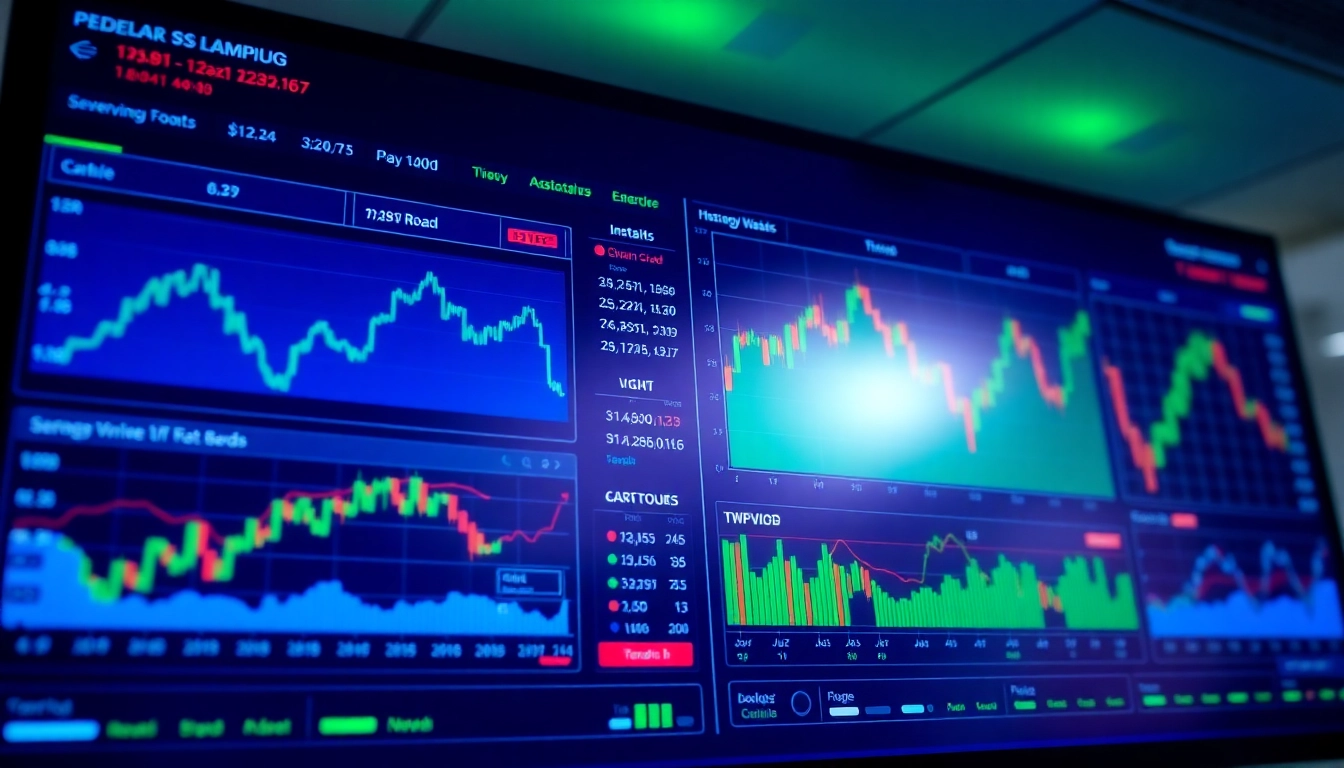Understanding the Importance of Stock Market News for Investors
In the fast-paced world of investing, staying informed is crucial to making sound decisions. The heartbeat of financial markets is often reflected in real-time news updates that influence investor sentiment, strategic choices, and ultimately, portfolio performance. Stock Market News acts as a vital resource, providing insights that can distinguish successful investors from those caught unprepared. Recognizing the significance of timely, accurate news allows investors to navigate volatility, spot opportunities early, and mitigate risks effectively.
Why timely updates matter in today’s financial landscape
Modern financial markets operate at a breakneck speed, driven by technological advancements and global interconnectedness. News updates now arrive instantaneously via digital platforms, social media, and specialized financial tools. A delay of even minutes can mean missing critical events, such as earnings surprises, geopolitical developments, or policy changes, that can drastically impact asset prices. For example, a sudden change in Federal Reserve interest rate expectations can trigger swift shifts in stock valuations. Investors who are equipped with timely news can respond swiftly—buying undervalued stocks or avoiding emerging pitfalls—thus gaining a strategic advantage.
Key sources for reliable stock market news
Accessing credible sources is essential to avoid misinformation that can lead to poor investment decisions. Leading financial news platforms like Bloomberg, CNBC, Reuters, and The Wall Street Journal provide rigorous, vetted information. Additionally, official economic reports from the Federal Reserve, SEC filings, and company press releases serve as primary data points for accurate analysis. Emerging tools like AI-driven news aggregators and specialized financial analytics platforms also help to filter relevant updates efficiently. Building a trusted ecosystem of news sources enhances an investor’s ability to interpret events accurately and act confidently.
How stock news influences investment decisions
Market news directly impacts investor behavior by shaping perceptions about asset value, risk, and future prospects. For instance, positive earnings news can boost a company’s stock price as confidence grows, while geopolitical tensions may lead to sell-offs across markets. Skilled investors interpret these signals in context, weighing them against fundamental data and technical trends to decide whether to buy, hold, or sell. Moreover, understanding the psychological impact of news—such as panic selling during market dips—helps investors maintain discipline and avoid impulsive decisions driven by short-term sentiment.
Strategies to Access and Interpret Stock Market News Effectively
Using financial news platforms and tools
Employing advanced tools like real-time dashboards, news tickers, and alert systems can be instrumental. Platforms such as TradingView, MarketWatch, and Bloomberg Terminal offer customizable alerts, allowing investors to monitor specific stocks, sectors, or macroeconomic indicators continuously. Integration with mobile apps ensures updates are accessible on the go, enabling swift decision-making. Setting predefined thresholds—for example, news that affects a stock’s target price—helps filter noise and focus on actionable information.
Analyzing market trends and headlines
Effective news interpretation involves contextual analysis. Recognizing whether a headline signals a short-term noise or a fundamental shift is key. For example, a headline about a regulatory crackdown might initially cause panic but could be a temporary hurdle if the fundamental outlook remains strong. Investors should analyze the underlying data, cross-reference multiple sources, and identify recurring themes. Trend analysis, combined with technical charts, can reveal whether news confirms existing patterns or signals a new directional change.
Avoiding misinformation and sensationalism
In an era rife with rumors and sensational headlines, critical thinking is vital. Investors should verify news with reputable sources before acting. Relying solely on social media or unverified blogs can lead to costly mistakes. Implementing filters—such as checking the credibility of the source, corroborating news across multiple outlets, or waiting for official confirmations—reduces exposure to misinformation. Developing a disciplined approach to news consumption ensures decisions are grounded in factual, reliable data rather than hype.
Integrating Stock Market News into Your Investment Plan
Developing a news-driven trading strategy
A sophisticated trading plan incorporates news analysis as a core component. This involves setting clear criteria for trading signals triggered by specific news events or sentiment shifts. For example, earnings beats might prompt immediate buying, while regulatory threats could signal exits. Strategies such as event-driven trading capitalize on volatility created by news releases, requiring swift execution and well-defined risk management protocols.
Balancing news analysis with technical and fundamental analysis
While news provides immediate context, combining it with technical and fundamental analysis creates a holistic view. Fundamental analysis assesses long-term viability based on financial health, market position, and macroeconomic factors. Technical analysis flags entry and exit points through chart patterns and indicators. Integrating these methods ensures that news acts as a catalyst rather than a standalone trigger, reducing impulsive decisions and improving overall investment precision.
Monitoring news impact on portfolio performance
Continuous performance monitoring allows investors to evaluate how news-driven decisions affect returns. Tracking metrics such as Sharpe ratio, win-loss ratio, and drawdowns provides quantitative insights. Regularly reviewing portfolio reactions to market news helps refine strategies, identify biases, and adapt to changing market conditions. Efficient feedback loops ensure that investors learn from both successes and missteps, enhancing future decision-making.
Emerging Trends and Future of Stock Market News
Real-time data and AI-driven insights
Advances in artificial intelligence and machine learning are revolutionizing news analytics. AI models sift through massive data streams to generate predictive insights, detect sentiment shifts, and identify early warning signals. These technologies enable investors to anticipate market movements before headlines fully materialize, offering a strategic edge in high-frequency trading and active investing.
Personalized news feeds and alerts
Customized news aggregation platforms now tailor updates based on individual portfolios, sectors, or investment interests. Personalized alerts can notify investors about relevant developments instantly via email, SMS, or app notifications. This targeted approach reduces information overload, allowing investors to focus on the news most pertinent to their strategies.
The role of social media and alternative news sources
Social media platforms like Twitter, Reddit, and financial forums have become influential in shaping market sentiment. While they can offer real-time, crowd-sourced insights, they also pose risks of misinformation. Smarter investors leverage social media by combining it with traditional sources, verifying claims, and understanding the broader social context affecting markets. The rise of alternative news sources emphasizes the importance of media literacy and critical evaluation in the future of stock market news.
Measuring Success with Stock Market News Strategies
Key performance indicators for news-based investing
Evaluating the effectiveness of news-driven strategies involves metrics like cumulative returns, risk-adjusted returns, and hit ratios. Tracking how well news-based decisions align with market movements helps investors refine their approach. Additionally, monitoring the time lag between news release and trade execution provides insights into responsiveness and execution efficiency.
Adjusting your approach based on market responses
Markets are dynamic; therefore, ongoing evaluation is essential. If a news analysis approach consistently underperforms, adjustments such as refining filtering criteria, expanding source diversity, or integrating additional analytical tools may be required. Flexibility and adaptability ensure that strategies remain relevant amidst shifting market landscapes.
Case studies of successful news-informed trading
Historical episodes, like the market reactions to the COVID-19 pandemic or trade policy announcements, showcase how timely and accurate news can lead to substantial gains. Case studies reveal best practices—such as pre-positioning ahead of expected news releases or quickly responding to headline changes—serving as valuable learning tools for investors seeking to enhance their own strategies.



